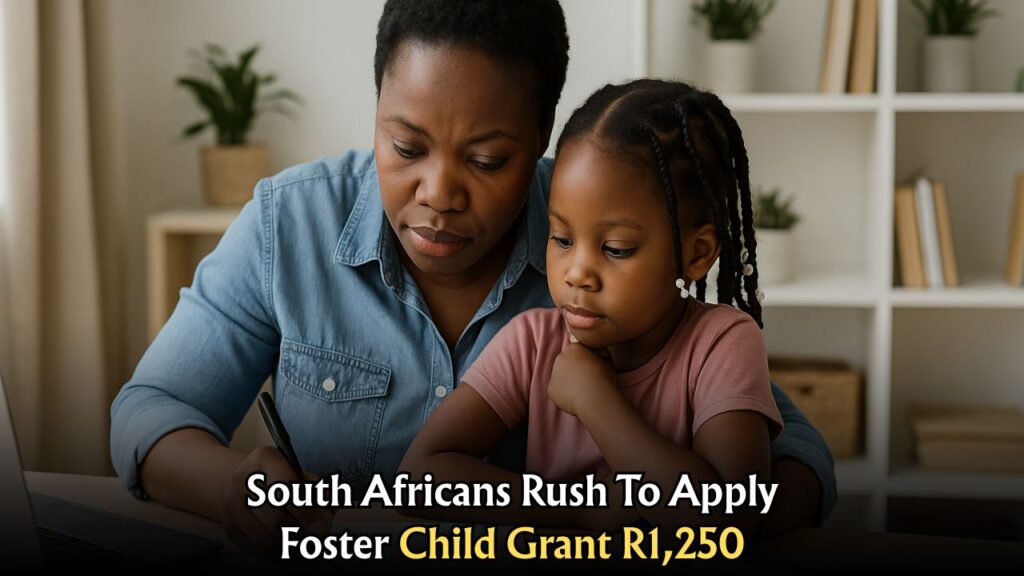R1,250 Foster Child Grant Applications Open: The South African Social Security Agency (SASSA) has announced that applications are now open for the R1,250 Foster Child Grant. This initiative is designed to provide financial assistance to South Africans who have taken on the responsibility of caring for foster children. With the cost of living steadily increasing, this grant aims to alleviate some of the financial burdens associated with raising a child. Whether you’re new to fostering or a seasoned caregiver, understanding the application process and eligibility requirements is crucial to securing this valuable support.

Understanding the R1,250 Foster Child Grant Eligibility
To be eligible for the R1,250 Foster Child Grant, applicants must meet specific criteria set forth by SASSA. Primarily, the grant is intended for individuals who have been legally appointed as foster parents and are caring for a child placed in their care by the court. The child in question must be under the age of 18, and both the foster parent and the child must reside in South Africa. It’s also important to note that the grant is not means-tested, meaning your financial status does not affect your eligibility. This consideration ensures that all foster parents, regardless of income, can access the necessary funding to support their foster children. Additionally, the grant is renewable every two years, providing ongoing support as long as the foster placement remains valid. Applicants are encouraged to keep all relevant documentation up-to-date to ensure uninterrupted access to the grant.
Application Process for the Foster Child Grant
Applying for the Foster Child Grant is a straightforward process, but it requires careful attention to detail to ensure that all requirements are met. Prospective applicants should begin by gathering all necessary documents, including a certified copy of the court order that appointed them as the foster parent, the child’s birth certificate, and both the foster parent’s and child’s South African IDs. Once all documentation is in order, applicants must visit their nearest SASSA office to complete the application process. During the application, SASSA officers will verify the documents and capture the applicant’s information into the system. It is crucial to ensure that all details are accurate to avoid delays in the grant’s approval. Once the application is submitted, applicants will be notified of the outcome via SMS or written communication. If approved, the grant payments will commence shortly thereafter, either through a bank account or a SASSA card.
Maximizing the Benefits of the Foster Child Grant
Once approved for the R1,250 Foster Child Grant, it is essential for foster parents to utilize the funds effectively to maximize the benefits for the child in their care. The grant is designed to cover basic needs such as food, clothing, education, and healthcare. Foster parents should create a budget to ensure that the grant money is being used efficiently to support the child’s well-being and development. In some cases, additional services such as counseling and educational support may be beneficial, and foster parents are encouraged to seek out community resources that can complement the financial assistance provided by the grant. It’s also important for foster parents to maintain open communication with social workers and other support services to ensure that the child’s needs are being met holistically. By actively engaging in the child’s life and utilizing available resources, foster parents can create a nurturing environment that promotes the child’s growth and success.
Future Considerations for Foster Caregivers
As foster caregivers navigate the complexities of providing for a child in their care, it’s essential to stay informed about potential changes to foster care policies and grants. SASSA periodically reviews the grant amounts and eligibility criteria to ensure they remain relevant and effective. Foster parents should remain engaged with SASSA’s communications to stay updated on any changes that could affect their grant. Additionally, as society continues to evolve, there may be new opportunities for foster parents to access additional support services. Engaging with other foster caregivers and participating in support groups can provide valuable insights and shared experiences that can enhance the caregiving experience. By staying informed and proactive, foster parents can continue to provide exceptional care and support to foster children, helping them to thrive in a loving and supportive environment.




